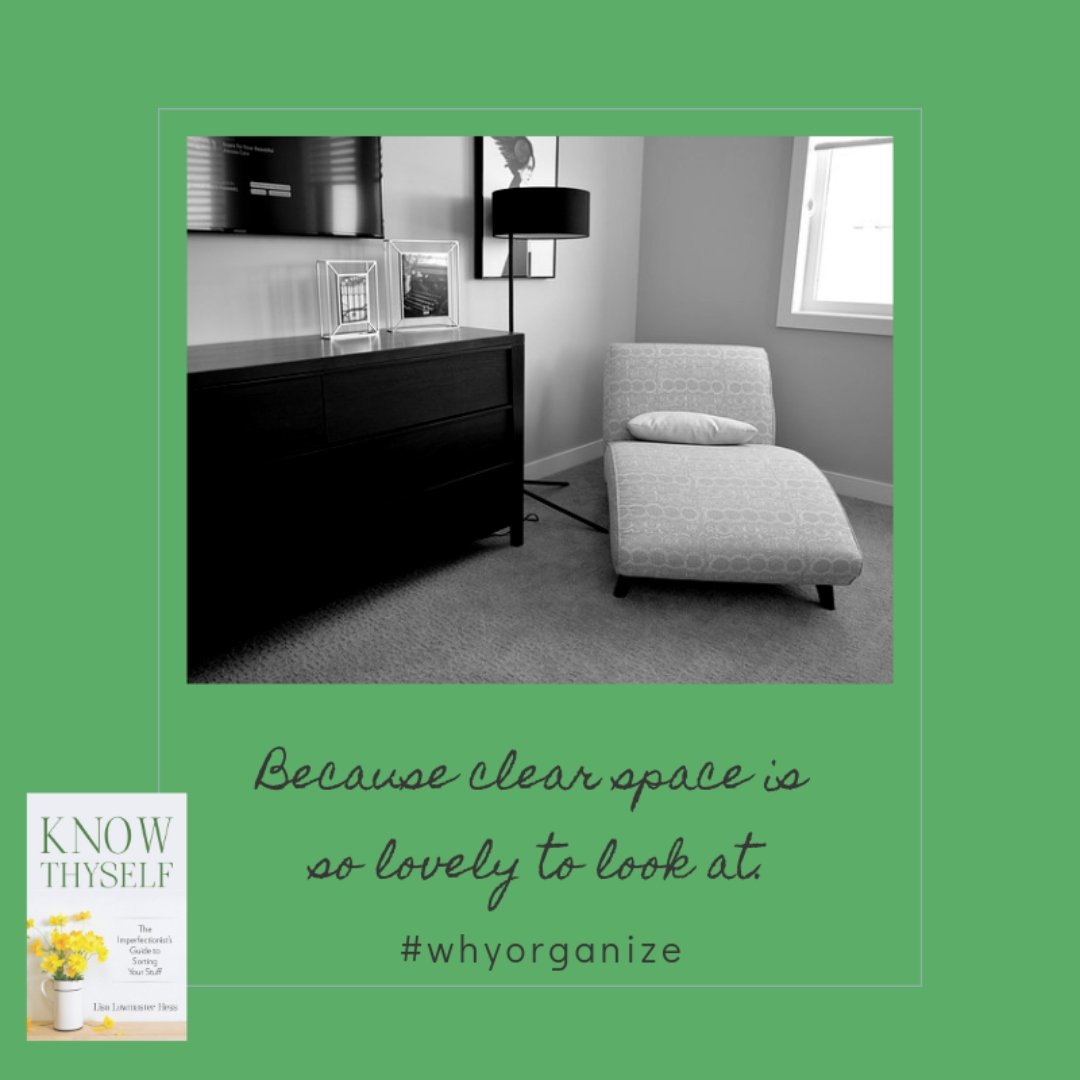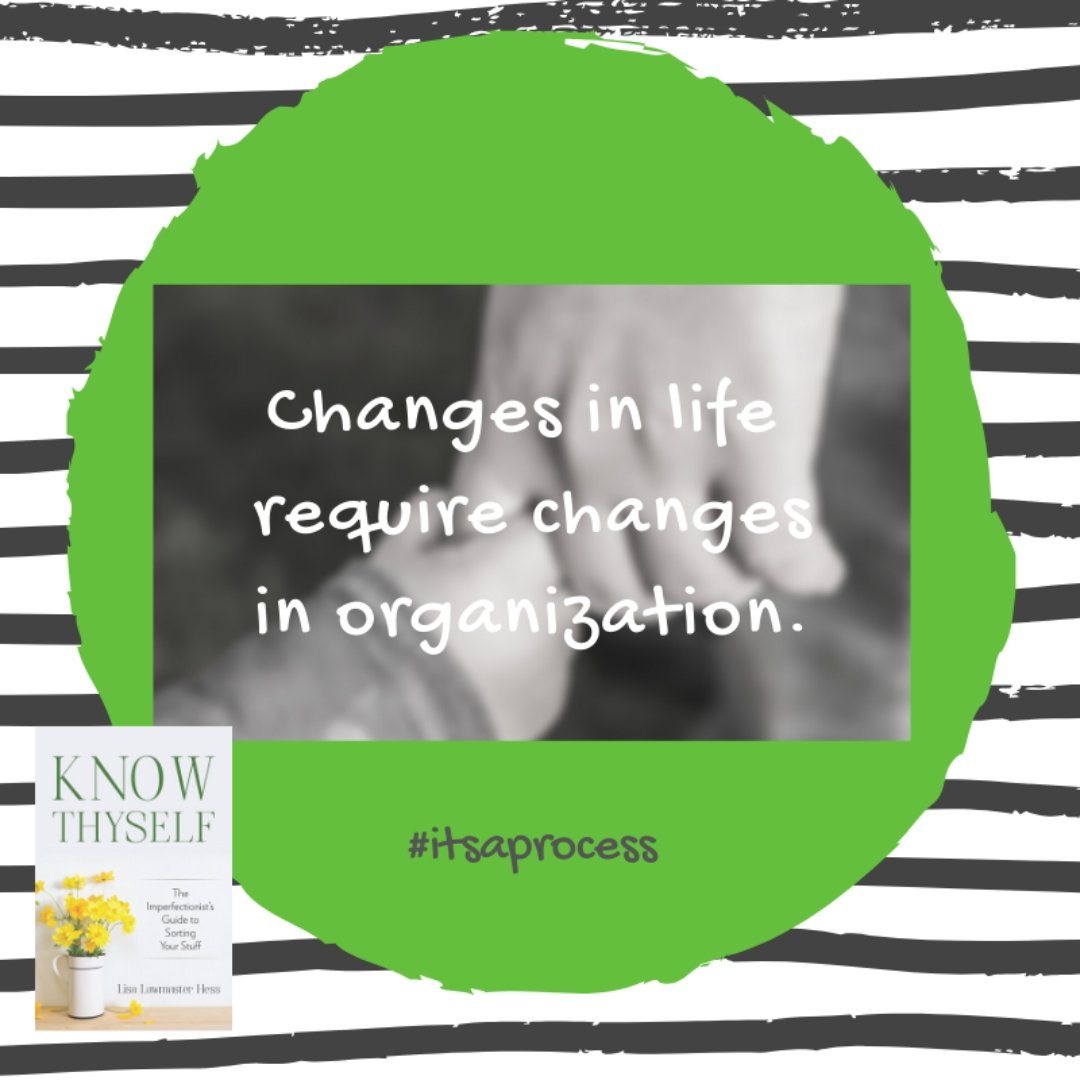
Lisa Hess ponders how to take small steps to account for real-life interruptions in our routines and organizing strategies.
Earlier this month, as I sat down to set some organizing goals for January, I felt a little twinge of frustration. Why did it seem as though I kept writing down the same organizing wish list every month?
Upon closer inspection, I realized that some of these recurring tasks were just that: recurring. They got checked off the list and then life intervened, things got cluttered, and they were back on the list again.
Others were big projects – the kind I kept promising myself I’d chip away at. I’d be good at doing that for a while and then life would intervene and not only would they not get finished, things would re-accumulate.
Are you sensing a pattern here?
If you said “life intervenes,” give yourself ten wisdom points. Yes, the answer was somewhat obvious, but it’s one we often fail to (or choose not to) acknowledge when it comes to organizing. It is, however, a major contributing factor to the fact that our organizing to-do lists so often look the same from one month to the next.
Acknowledging the problem is the first step, but smart organizers go one step further. We look for a corresponding solution.
Earlier this month, a friend of mine posted the following C. S. Lewis quote on her Facebook page:
We must stop regarding unpleasant or unexpected things as interruptions of real life.
The truth is that interruptions are real life.
And (me speaking now), real life is a major contributing factor to our ongoing need to not only organize, but re-organize.
The good news is that if we’ve set up systems that work with our styles, the re-organizing is a reasonably smooth process. But what about those big tasks? The ones that we never seem to make good progress on? (Yes, I’m talking about you, basement organization).
We take small steps.

Back in November, I decided to try small steps in a new way: one-hour projects. Each week, I’d dedicate an hour to one of my organizing goals. I’d choose a task, set a timer, and give myself permission to stop when the timer went off. I might not get the task finished, but at least I'd make progress.
That was November. Before Thanksgiving. Before Christmas. Are you guessing where this is going?
Life intervened.
I stand by my one-hour project idea and, with some time left before classes start again at the end of the month, I might just try it again, but I also wanted to add something simpler.
As I laid out my January goals, I used one of the two-page spreads for each month in my undated planner (not my everyday planner) as a grid, jotting down as many 2022 organizing projects as I could think of. While brainstorming this way can be a little overwhelming, my intended payoff was (I hoped) fewer “pop-up” projects throughout the year.
Next up: tackling the projects. I opted not to assign each task a date (the opposite of what most time managers recommend), choosing instead to pick a one-hour task each week and/or to simply approach each day asking myself what was one space I wanted to improve that day. Note the choice of the word “improve” – not “fix,” “re-do” or, worse yet “overhaul.”
Small steps.
As I tackle each task, whether assigned, spontaneous, or added on as the year progresses, I can place a check mark in its box on the grid. When I’m fairly certain the task is complete (e.g. all the Christmas decorations are put away), I can check the task off as complete (big checkmark). When it’s a task I’m pretty sure I’ll be looking at again (e.g. clear off the counter everyone drops things on), I can still acknowledge my success with a small checkmark.
As someone with an I need to see it personal style, I appreciate having everything all laid out, and I also know from my reading and from personal experience that writing something down makes it more likely that it will get done. By laying everything out in my goals book rather than my daily planner, I review it monthly, but I don’t feel ambushed by the list every time I open my planner. At the end of each month and at the end of the year, I have a record of all the progress I’ve made so that, even if it’s not visible next December when Christmas once again takes over the house, I can see what I’ve done, and what remains to be done instead of just focusing on the latter.

As someone who likes to organize things, I’m absurdly excited about this plan. I especially like the “what can I make just a little bit better today?” approach because it gets me closer and closer to my favorite part of being organized -- clear spaces – without having to invest time I don’t have on days that are jam-packed.
Organizing is important, but it’s only one aspect of life. How will you use small steps to make organizing a small but sustainable part of your 2022?
Copyright 2022 Lisa Hess
Images: (top) Canva Pro; other images created in Canva by the author, all rights reserved.
About the Author

Lisa Hess
Transplanted Jersey girl Lisa Lawmaster Hess is the author of a blog compilation, three novels, and three non-fiction books, including the award-winning Know Thyself: The Imperfectionist’s Guide to Sorting Your Stuff. A retired elementary school counselor, Lisa is an adjunct professor of psychology at York College of Pennsylvania. She blogs at The Porch Swing Chronicles, Organizing by STYLE, and here at Catholicmom.com. Read all articles by Lisa Hess.


.png?width=1806&height=731&name=CatholicMom_hcfm_logo1_pos_871c_2728c%20(002).png)
Comments